Analysis of the Contemporary Hospitality Industry: Shangri-La
VerifiedAdded on 2023/01/11
|13
|4063
|56
Report
AI Summary
This report provides a comprehensive analysis of the contemporary hospitality industry, using Shangri-La Hotels and Resorts as a case study. It begins with an investigation into various types of businesses within the hospitality sector, including travel and tourism, lodging, restaurants, and event management. The report then delves into the operational roles and functional departments within Shangri-La, differentiating between front-house and back-house operations. It explores the contributions of the hospitality industry to international, national, and local economies. The report further examines different operational roles within the sector, such as housekeeping, sales and marketing, and front desk facilities, alongside the skills required for these roles and current skills shortages. A PESTLE analysis is conducted to assess the political, economic, social, technological, legal, and environmental factors impacting Shangri-La's operations, complemented by a SWOT analysis. Finally, the report considers the implications of current and potential trends in the hospitality industry, offering a well-rounded overview of the sector.
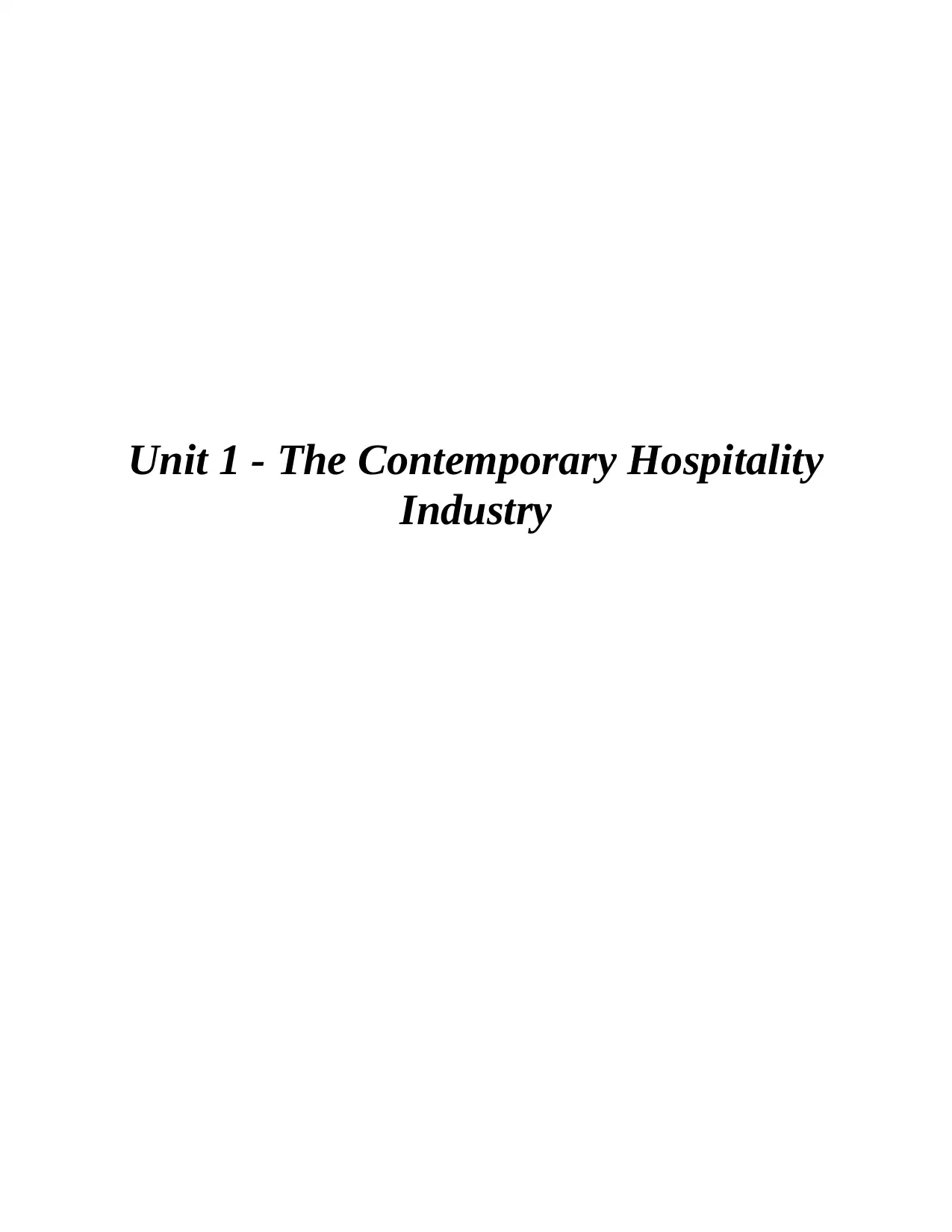
Unit 1 - The Contemporary Hospitality
Industry
Industry
Paraphrase This Document
Need a fresh take? Get an instant paraphrase of this document with our AI Paraphraser
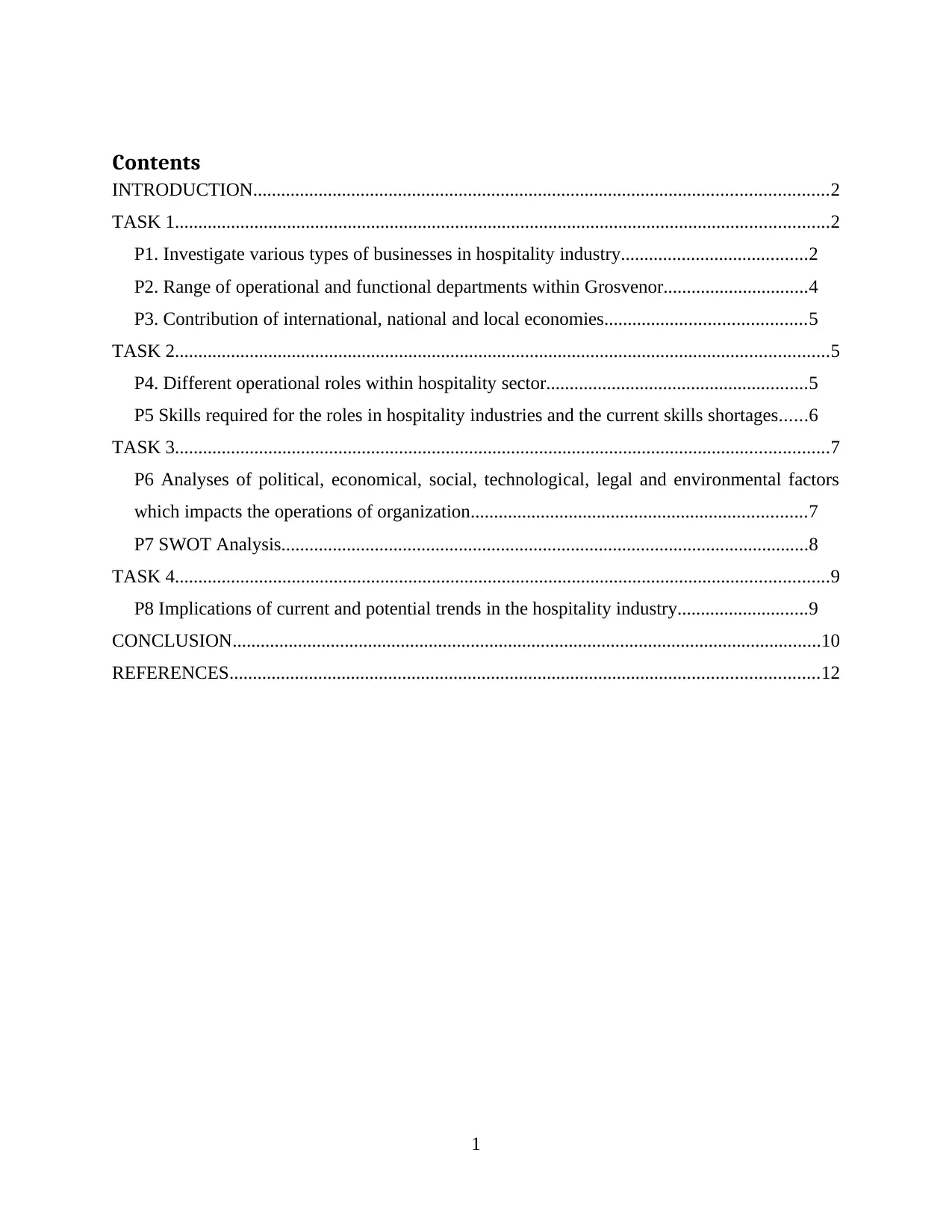
Contents
INTRODUCTION...........................................................................................................................2
TASK 1............................................................................................................................................2
P1. Investigate various types of businesses in hospitality industry........................................2
P2. Range of operational and functional departments within Grosvenor...............................4
P3. Contribution of international, national and local economies...........................................5
TASK 2............................................................................................................................................5
P4. Different operational roles within hospitality sector........................................................5
P5 Skills required for the roles in hospitality industries and the current skills shortages......6
TASK 3............................................................................................................................................7
P6 Analyses of political, economical, social, technological, legal and environmental factors
which impacts the operations of organization........................................................................7
P7 SWOT Analysis.................................................................................................................8
TASK 4............................................................................................................................................9
P8 Implications of current and potential trends in the hospitality industry............................9
CONCLUSION..............................................................................................................................10
REFERENCES..............................................................................................................................12
1
INTRODUCTION...........................................................................................................................2
TASK 1............................................................................................................................................2
P1. Investigate various types of businesses in hospitality industry........................................2
P2. Range of operational and functional departments within Grosvenor...............................4
P3. Contribution of international, national and local economies...........................................5
TASK 2............................................................................................................................................5
P4. Different operational roles within hospitality sector........................................................5
P5 Skills required for the roles in hospitality industries and the current skills shortages......6
TASK 3............................................................................................................................................7
P6 Analyses of political, economical, social, technological, legal and environmental factors
which impacts the operations of organization........................................................................7
P7 SWOT Analysis.................................................................................................................8
TASK 4............................................................................................................................................9
P8 Implications of current and potential trends in the hospitality industry............................9
CONCLUSION..............................................................................................................................10
REFERENCES..............................................................................................................................12
1
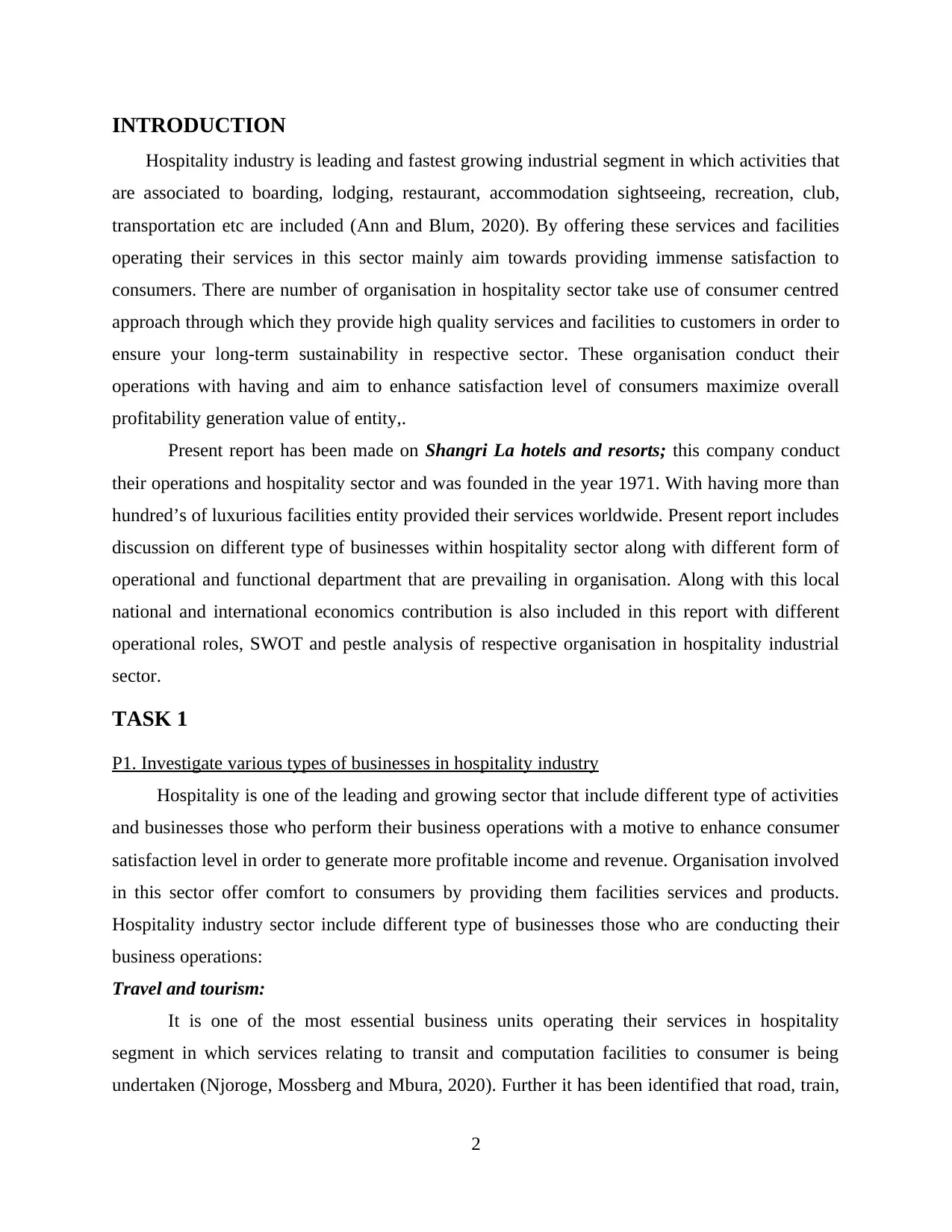
INTRODUCTION
Hospitality industry is leading and fastest growing industrial segment in which activities that
are associated to boarding, lodging, restaurant, accommodation sightseeing, recreation, club,
transportation etc are included (Ann and Blum, 2020). By offering these services and facilities
operating their services in this sector mainly aim towards providing immense satisfaction to
consumers. There are number of organisation in hospitality sector take use of consumer centred
approach through which they provide high quality services and facilities to customers in order to
ensure your long-term sustainability in respective sector. These organisation conduct their
operations with having and aim to enhance satisfaction level of consumers maximize overall
profitability generation value of entity,.
Present report has been made on Shangri La hotels and resorts; this company conduct
their operations and hospitality sector and was founded in the year 1971. With having more than
hundred’s of luxurious facilities entity provided their services worldwide. Present report includes
discussion on different type of businesses within hospitality sector along with different form of
operational and functional department that are prevailing in organisation. Along with this local
national and international economics contribution is also included in this report with different
operational roles, SWOT and pestle analysis of respective organisation in hospitality industrial
sector.
TASK 1
P1. Investigate various types of businesses in hospitality industry
Hospitality is one of the leading and growing sector that include different type of activities
and businesses those who perform their business operations with a motive to enhance consumer
satisfaction level in order to generate more profitable income and revenue. Organisation involved
in this sector offer comfort to consumers by providing them facilities services and products.
Hospitality industry sector include different type of businesses those who are conducting their
business operations:
Travel and tourism:
It is one of the most essential business units operating their services in hospitality
segment in which services relating to transit and computation facilities to consumer is being
undertaken (Njoroge, Mossberg and Mbura, 2020). Further it has been identified that road, train,
2
Hospitality industry is leading and fastest growing industrial segment in which activities that
are associated to boarding, lodging, restaurant, accommodation sightseeing, recreation, club,
transportation etc are included (Ann and Blum, 2020). By offering these services and facilities
operating their services in this sector mainly aim towards providing immense satisfaction to
consumers. There are number of organisation in hospitality sector take use of consumer centred
approach through which they provide high quality services and facilities to customers in order to
ensure your long-term sustainability in respective sector. These organisation conduct their
operations with having and aim to enhance satisfaction level of consumers maximize overall
profitability generation value of entity,.
Present report has been made on Shangri La hotels and resorts; this company conduct
their operations and hospitality sector and was founded in the year 1971. With having more than
hundred’s of luxurious facilities entity provided their services worldwide. Present report includes
discussion on different type of businesses within hospitality sector along with different form of
operational and functional department that are prevailing in organisation. Along with this local
national and international economics contribution is also included in this report with different
operational roles, SWOT and pestle analysis of respective organisation in hospitality industrial
sector.
TASK 1
P1. Investigate various types of businesses in hospitality industry
Hospitality is one of the leading and growing sector that include different type of activities
and businesses those who perform their business operations with a motive to enhance consumer
satisfaction level in order to generate more profitable income and revenue. Organisation involved
in this sector offer comfort to consumers by providing them facilities services and products.
Hospitality industry sector include different type of businesses those who are conducting their
business operations:
Travel and tourism:
It is one of the most essential business units operating their services in hospitality
segment in which services relating to transit and computation facilities to consumer is being
undertaken (Njoroge, Mossberg and Mbura, 2020). Further it has been identified that road, train,
2
⊘ This is a preview!⊘
Do you want full access?
Subscribe today to unlock all pages.

Trusted by 1+ million students worldwide
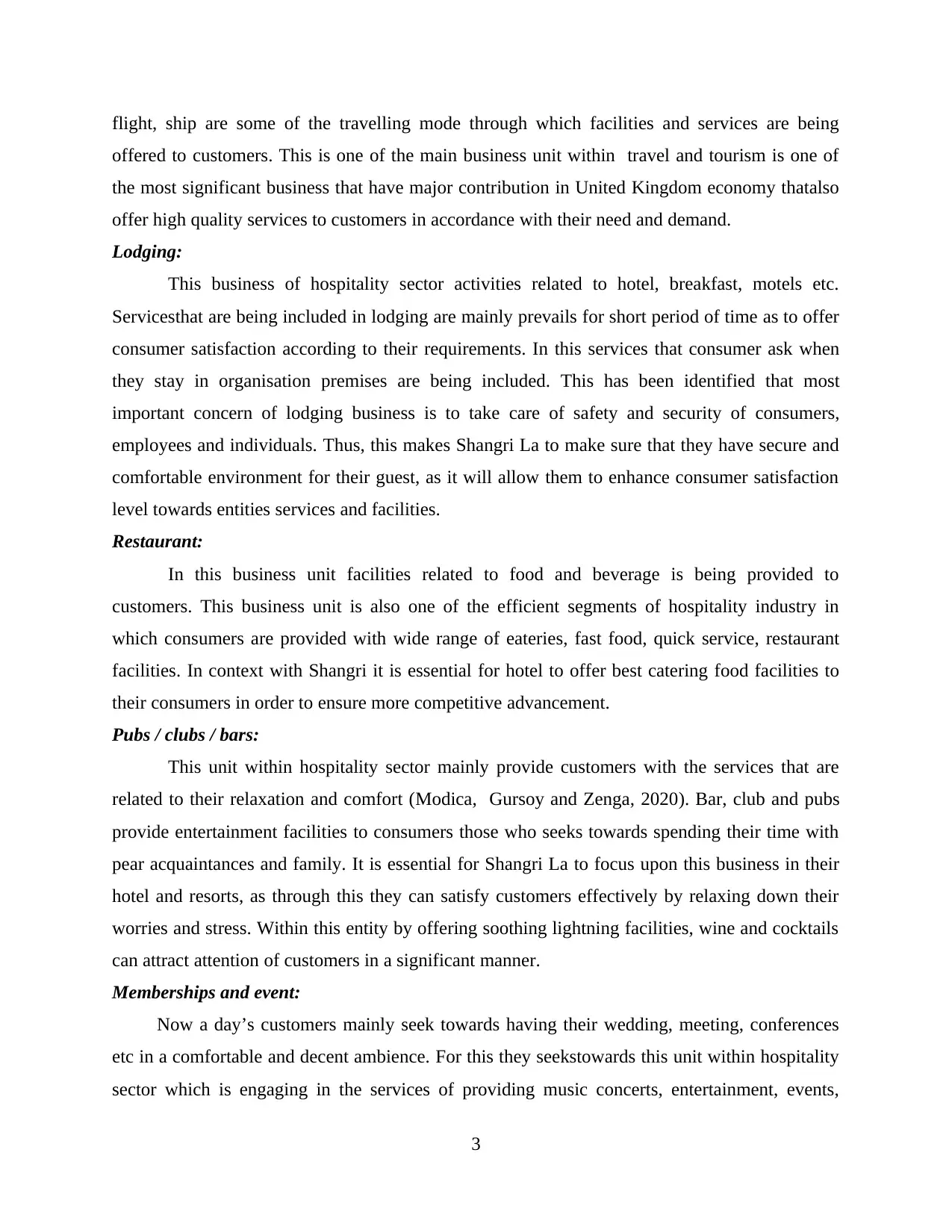
flight, ship are some of the travelling mode through which facilities and services are being
offered to customers. This is one of the main business unit within travel and tourism is one of
the most significant business that have major contribution in United Kingdom economy thatalso
offer high quality services to customers in accordance with their need and demand.
Lodging:
This business of hospitality sector activities related to hotel, breakfast, motels etc.
Servicesthat are being included in lodging are mainly prevails for short period of time as to offer
consumer satisfaction according to their requirements. In this services that consumer ask when
they stay in organisation premises are being included. This has been identified that most
important concern of lodging business is to take care of safety and security of consumers,
employees and individuals. Thus, this makes Shangri La to make sure that they have secure and
comfortable environment for their guest, as it will allow them to enhance consumer satisfaction
level towards entities services and facilities.
Restaurant:
In this business unit facilities related to food and beverage is being provided to
customers. This business unit is also one of the efficient segments of hospitality industry in
which consumers are provided with wide range of eateries, fast food, quick service, restaurant
facilities. In context with Shangri it is essential for hotel to offer best catering food facilities to
their consumers in order to ensure more competitive advancement.
Pubs / clubs / bars:
This unit within hospitality sector mainly provide customers with the services that are
related to their relaxation and comfort (Modica, Gursoy and Zenga, 2020). Bar, club and pubs
provide entertainment facilities to consumers those who seeks towards spending their time with
pear acquaintances and family. It is essential for Shangri La to focus upon this business in their
hotel and resorts, as through this they can satisfy customers effectively by relaxing down their
worries and stress. Within this entity by offering soothing lightning facilities, wine and cocktails
can attract attention of customers in a significant manner.
Memberships and event:
Now a day’s customers mainly seek towards having their wedding, meeting, conferences
etc in a comfortable and decent ambience. For this they seekstowards this unit within hospitality
sector which is engaging in the services of providing music concerts, entertainment, events,
3
offered to customers. This is one of the main business unit within travel and tourism is one of
the most significant business that have major contribution in United Kingdom economy thatalso
offer high quality services to customers in accordance with their need and demand.
Lodging:
This business of hospitality sector activities related to hotel, breakfast, motels etc.
Servicesthat are being included in lodging are mainly prevails for short period of time as to offer
consumer satisfaction according to their requirements. In this services that consumer ask when
they stay in organisation premises are being included. This has been identified that most
important concern of lodging business is to take care of safety and security of consumers,
employees and individuals. Thus, this makes Shangri La to make sure that they have secure and
comfortable environment for their guest, as it will allow them to enhance consumer satisfaction
level towards entities services and facilities.
Restaurant:
In this business unit facilities related to food and beverage is being provided to
customers. This business unit is also one of the efficient segments of hospitality industry in
which consumers are provided with wide range of eateries, fast food, quick service, restaurant
facilities. In context with Shangri it is essential for hotel to offer best catering food facilities to
their consumers in order to ensure more competitive advancement.
Pubs / clubs / bars:
This unit within hospitality sector mainly provide customers with the services that are
related to their relaxation and comfort (Modica, Gursoy and Zenga, 2020). Bar, club and pubs
provide entertainment facilities to consumers those who seeks towards spending their time with
pear acquaintances and family. It is essential for Shangri La to focus upon this business in their
hotel and resorts, as through this they can satisfy customers effectively by relaxing down their
worries and stress. Within this entity by offering soothing lightning facilities, wine and cocktails
can attract attention of customers in a significant manner.
Memberships and event:
Now a day’s customers mainly seek towards having their wedding, meeting, conferences
etc in a comfortable and decent ambience. For this they seekstowards this unit within hospitality
sector which is engaging in the services of providing music concerts, entertainment, events,
3
Paraphrase This Document
Need a fresh take? Get an instant paraphrase of this document with our AI Paraphraser
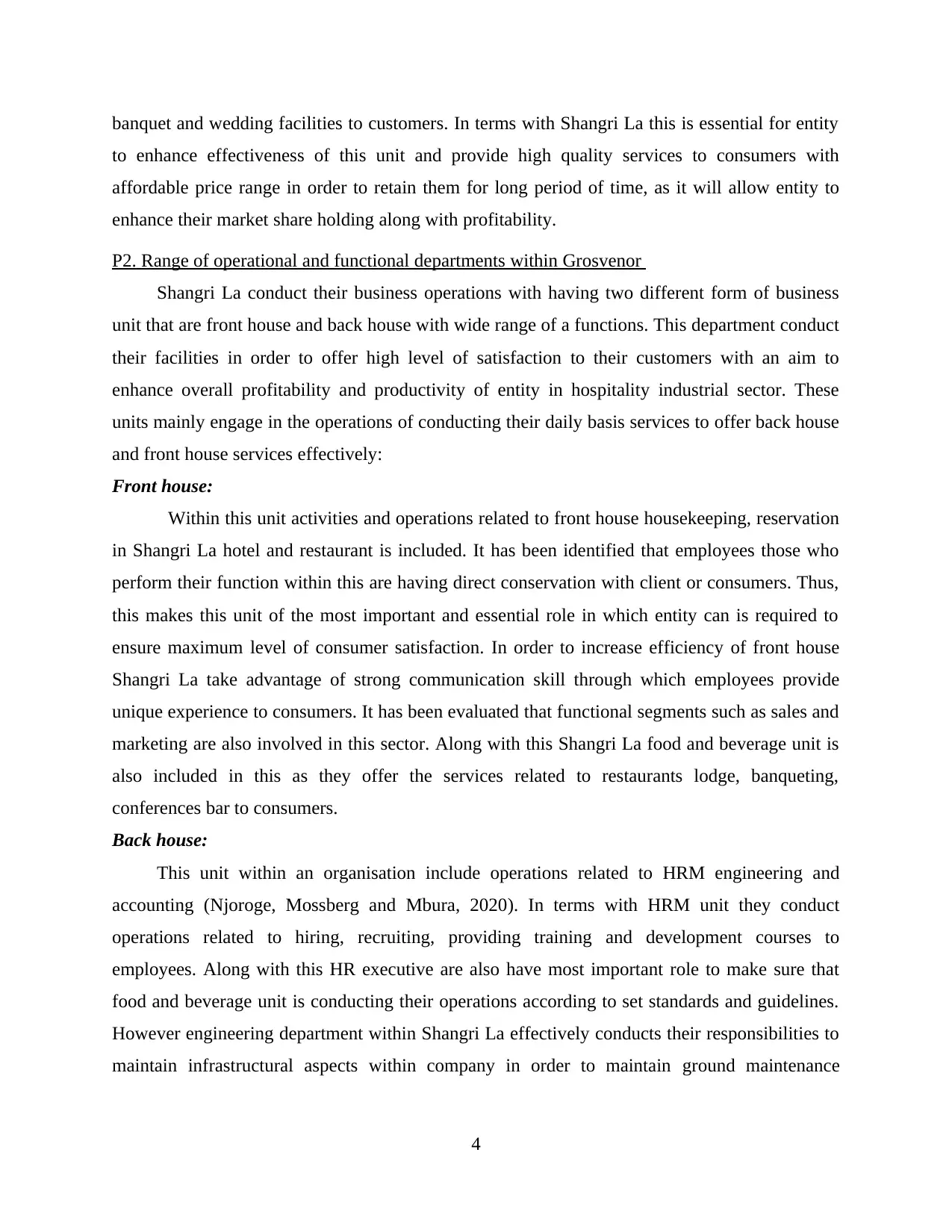
banquet and wedding facilities to customers. In terms with Shangri La this is essential for entity
to enhance effectiveness of this unit and provide high quality services to consumers with
affordable price range in order to retain them for long period of time, as it will allow entity to
enhance their market share holding along with profitability.
P2. Range of operational and functional departments within Grosvenor
Shangri La conduct their business operations with having two different form of business
unit that are front house and back house with wide range of a functions. This department conduct
their facilities in order to offer high level of satisfaction to their customers with an aim to
enhance overall profitability and productivity of entity in hospitality industrial sector. These
units mainly engage in the operations of conducting their daily basis services to offer back house
and front house services effectively:
Front house:
Within this unit activities and operations related to front house housekeeping, reservation
in Shangri La hotel and restaurant is included. It has been identified that employees those who
perform their function within this are having direct conservation with client or consumers. Thus,
this makes this unit of the most important and essential role in which entity can is required to
ensure maximum level of consumer satisfaction. In order to increase efficiency of front house
Shangri La take advantage of strong communication skill through which employees provide
unique experience to consumers. It has been evaluated that functional segments such as sales and
marketing are also involved in this sector. Along with this Shangri La food and beverage unit is
also included in this as they offer the services related to restaurants lodge, banqueting,
conferences bar to consumers.
Back house:
This unit within an organisation include operations related to HRM engineering and
accounting (Njoroge, Mossberg and Mbura, 2020). In terms with HRM unit they conduct
operations related to hiring, recruiting, providing training and development courses to
employees. Along with this HR executive are also have most important role to make sure that
food and beverage unit is conducting their operations according to set standards and guidelines.
However engineering department within Shangri La effectively conducts their responsibilities to
maintain infrastructural aspects within company in order to maintain ground maintenance
4
to enhance effectiveness of this unit and provide high quality services to consumers with
affordable price range in order to retain them for long period of time, as it will allow entity to
enhance their market share holding along with profitability.
P2. Range of operational and functional departments within Grosvenor
Shangri La conduct their business operations with having two different form of business
unit that are front house and back house with wide range of a functions. This department conduct
their facilities in order to offer high level of satisfaction to their customers with an aim to
enhance overall profitability and productivity of entity in hospitality industrial sector. These
units mainly engage in the operations of conducting their daily basis services to offer back house
and front house services effectively:
Front house:
Within this unit activities and operations related to front house housekeeping, reservation
in Shangri La hotel and restaurant is included. It has been identified that employees those who
perform their function within this are having direct conservation with client or consumers. Thus,
this makes this unit of the most important and essential role in which entity can is required to
ensure maximum level of consumer satisfaction. In order to increase efficiency of front house
Shangri La take advantage of strong communication skill through which employees provide
unique experience to consumers. It has been evaluated that functional segments such as sales and
marketing are also involved in this sector. Along with this Shangri La food and beverage unit is
also included in this as they offer the services related to restaurants lodge, banqueting,
conferences bar to consumers.
Back house:
This unit within an organisation include operations related to HRM engineering and
accounting (Njoroge, Mossberg and Mbura, 2020). In terms with HRM unit they conduct
operations related to hiring, recruiting, providing training and development courses to
employees. Along with this HR executive are also have most important role to make sure that
food and beverage unit is conducting their operations according to set standards and guidelines.
However engineering department within Shangri La effectively conducts their responsibilities to
maintain infrastructural aspects within company in order to maintain ground maintenance
4
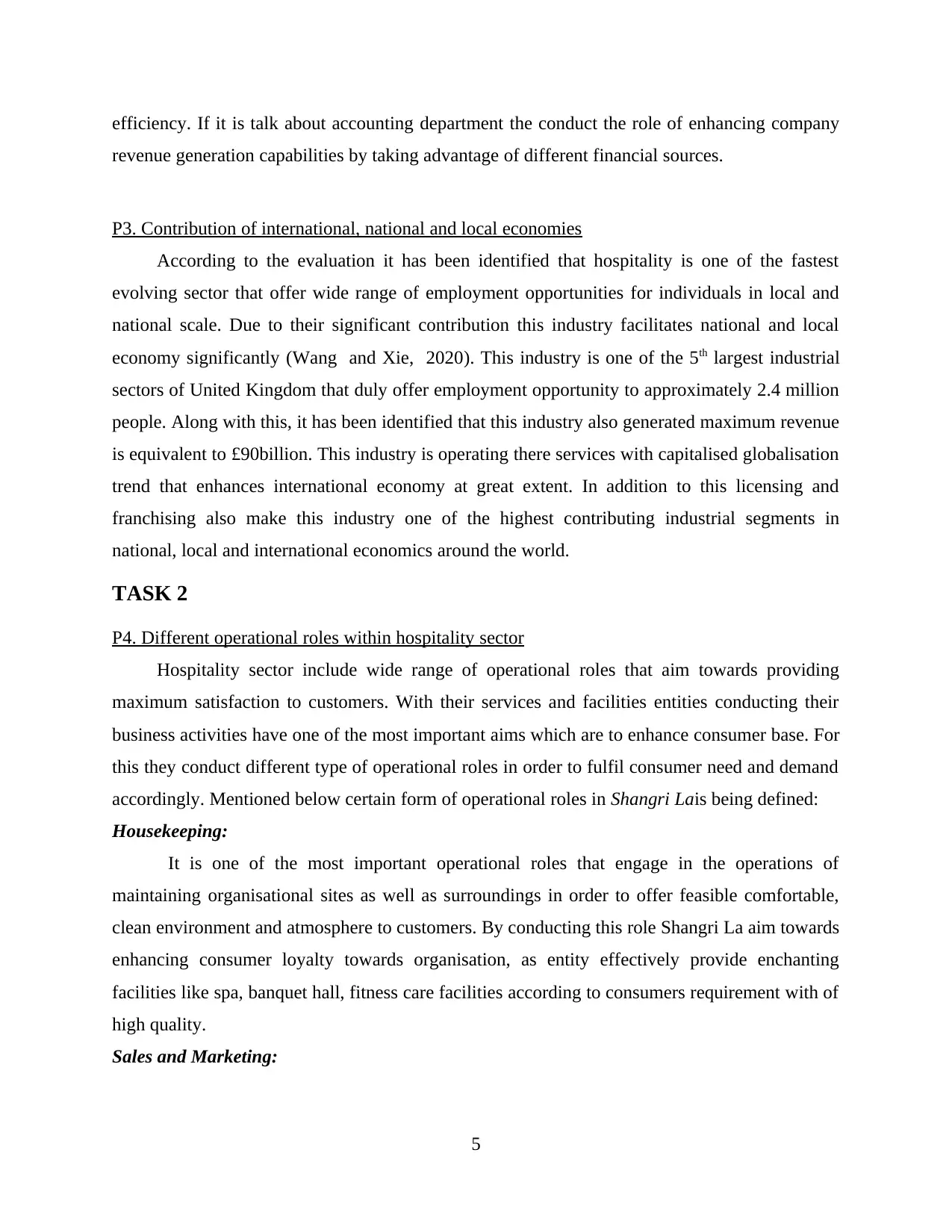
efficiency. If it is talk about accounting department the conduct the role of enhancing company
revenue generation capabilities by taking advantage of different financial sources.
P3. Contribution of international, national and local economies
According to the evaluation it has been identified that hospitality is one of the fastest
evolving sector that offer wide range of employment opportunities for individuals in local and
national scale. Due to their significant contribution this industry facilitates national and local
economy significantly (Wang and Xie, 2020). This industry is one of the 5th largest industrial
sectors of United Kingdom that duly offer employment opportunity to approximately 2.4 million
people. Along with this, it has been identified that this industry also generated maximum revenue
is equivalent to £90billion. This industry is operating there services with capitalised globalisation
trend that enhances international economy at great extent. In addition to this licensing and
franchising also make this industry one of the highest contributing industrial segments in
national, local and international economics around the world.
TASK 2
P4. Different operational roles within hospitality sector
Hospitality sector include wide range of operational roles that aim towards providing
maximum satisfaction to customers. With their services and facilities entities conducting their
business activities have one of the most important aims which are to enhance consumer base. For
this they conduct different type of operational roles in order to fulfil consumer need and demand
accordingly. Mentioned below certain form of operational roles in Shangri Lais being defined:
Housekeeping:
It is one of the most important operational roles that engage in the operations of
maintaining organisational sites as well as surroundings in order to offer feasible comfortable,
clean environment and atmosphere to customers. By conducting this role Shangri La aim towards
enhancing consumer loyalty towards organisation, as entity effectively provide enchanting
facilities like spa, banquet hall, fitness care facilities according to consumers requirement with of
high quality.
Sales and Marketing:
5
revenue generation capabilities by taking advantage of different financial sources.
P3. Contribution of international, national and local economies
According to the evaluation it has been identified that hospitality is one of the fastest
evolving sector that offer wide range of employment opportunities for individuals in local and
national scale. Due to their significant contribution this industry facilitates national and local
economy significantly (Wang and Xie, 2020). This industry is one of the 5th largest industrial
sectors of United Kingdom that duly offer employment opportunity to approximately 2.4 million
people. Along with this, it has been identified that this industry also generated maximum revenue
is equivalent to £90billion. This industry is operating there services with capitalised globalisation
trend that enhances international economy at great extent. In addition to this licensing and
franchising also make this industry one of the highest contributing industrial segments in
national, local and international economics around the world.
TASK 2
P4. Different operational roles within hospitality sector
Hospitality sector include wide range of operational roles that aim towards providing
maximum satisfaction to customers. With their services and facilities entities conducting their
business activities have one of the most important aims which are to enhance consumer base. For
this they conduct different type of operational roles in order to fulfil consumer need and demand
accordingly. Mentioned below certain form of operational roles in Shangri Lais being defined:
Housekeeping:
It is one of the most important operational roles that engage in the operations of
maintaining organisational sites as well as surroundings in order to offer feasible comfortable,
clean environment and atmosphere to customers. By conducting this role Shangri La aim towards
enhancing consumer loyalty towards organisation, as entity effectively provide enchanting
facilities like spa, banquet hall, fitness care facilities according to consumers requirement with of
high quality.
Sales and Marketing:
5
⊘ This is a preview!⊘
Do you want full access?
Subscribe today to unlock all pages.

Trusted by 1+ million students worldwide
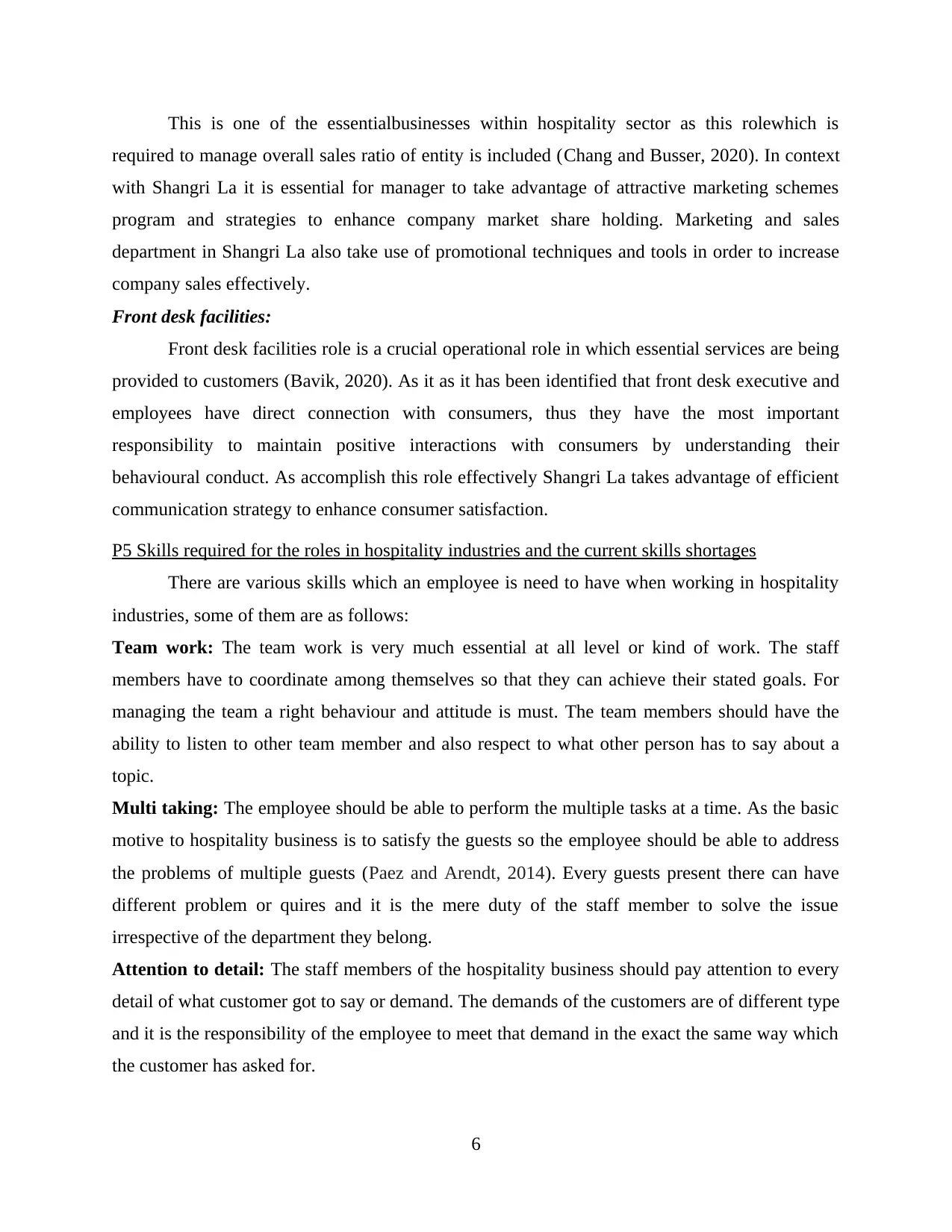
This is one of the essentialbusinesses within hospitality sector as this rolewhich is
required to manage overall sales ratio of entity is included (Chang and Busser, 2020). In context
with Shangri La it is essential for manager to take advantage of attractive marketing schemes
program and strategies to enhance company market share holding. Marketing and sales
department in Shangri La also take use of promotional techniques and tools in order to increase
company sales effectively.
Front desk facilities:
Front desk facilities role is a crucial operational role in which essential services are being
provided to customers (Bavik, 2020). As it as it has been identified that front desk executive and
employees have direct connection with consumers, thus they have the most important
responsibility to maintain positive interactions with consumers by understanding their
behavioural conduct. As accomplish this role effectively Shangri La takes advantage of efficient
communication strategy to enhance consumer satisfaction.
P5 Skills required for the roles in hospitality industries and the current skills shortages
There are various skills which an employee is need to have when working in hospitality
industries, some of them are as follows:
Team work: The team work is very much essential at all level or kind of work. The staff
members have to coordinate among themselves so that they can achieve their stated goals. For
managing the team a right behaviour and attitude is must. The team members should have the
ability to listen to other team member and also respect to what other person has to say about a
topic.
Multi taking: The employee should be able to perform the multiple tasks at a time. As the basic
motive to hospitality business is to satisfy the guests so the employee should be able to address
the problems of multiple guests (Paez and Arendt, 2014). Every guests present there can have
different problem or quires and it is the mere duty of the staff member to solve the issue
irrespective of the department they belong.
Attention to detail: The staff members of the hospitality business should pay attention to every
detail of what customer got to say or demand. The demands of the customers are of different type
and it is the responsibility of the employee to meet that demand in the exact the same way which
the customer has asked for.
6
required to manage overall sales ratio of entity is included (Chang and Busser, 2020). In context
with Shangri La it is essential for manager to take advantage of attractive marketing schemes
program and strategies to enhance company market share holding. Marketing and sales
department in Shangri La also take use of promotional techniques and tools in order to increase
company sales effectively.
Front desk facilities:
Front desk facilities role is a crucial operational role in which essential services are being
provided to customers (Bavik, 2020). As it as it has been identified that front desk executive and
employees have direct connection with consumers, thus they have the most important
responsibility to maintain positive interactions with consumers by understanding their
behavioural conduct. As accomplish this role effectively Shangri La takes advantage of efficient
communication strategy to enhance consumer satisfaction.
P5 Skills required for the roles in hospitality industries and the current skills shortages
There are various skills which an employee is need to have when working in hospitality
industries, some of them are as follows:
Team work: The team work is very much essential at all level or kind of work. The staff
members have to coordinate among themselves so that they can achieve their stated goals. For
managing the team a right behaviour and attitude is must. The team members should have the
ability to listen to other team member and also respect to what other person has to say about a
topic.
Multi taking: The employee should be able to perform the multiple tasks at a time. As the basic
motive to hospitality business is to satisfy the guests so the employee should be able to address
the problems of multiple guests (Paez and Arendt, 2014). Every guests present there can have
different problem or quires and it is the mere duty of the staff member to solve the issue
irrespective of the department they belong.
Attention to detail: The staff members of the hospitality business should pay attention to every
detail of what customer got to say or demand. The demands of the customers are of different type
and it is the responsibility of the employee to meet that demand in the exact the same way which
the customer has asked for.
6
Paraphrase This Document
Need a fresh take? Get an instant paraphrase of this document with our AI Paraphraser
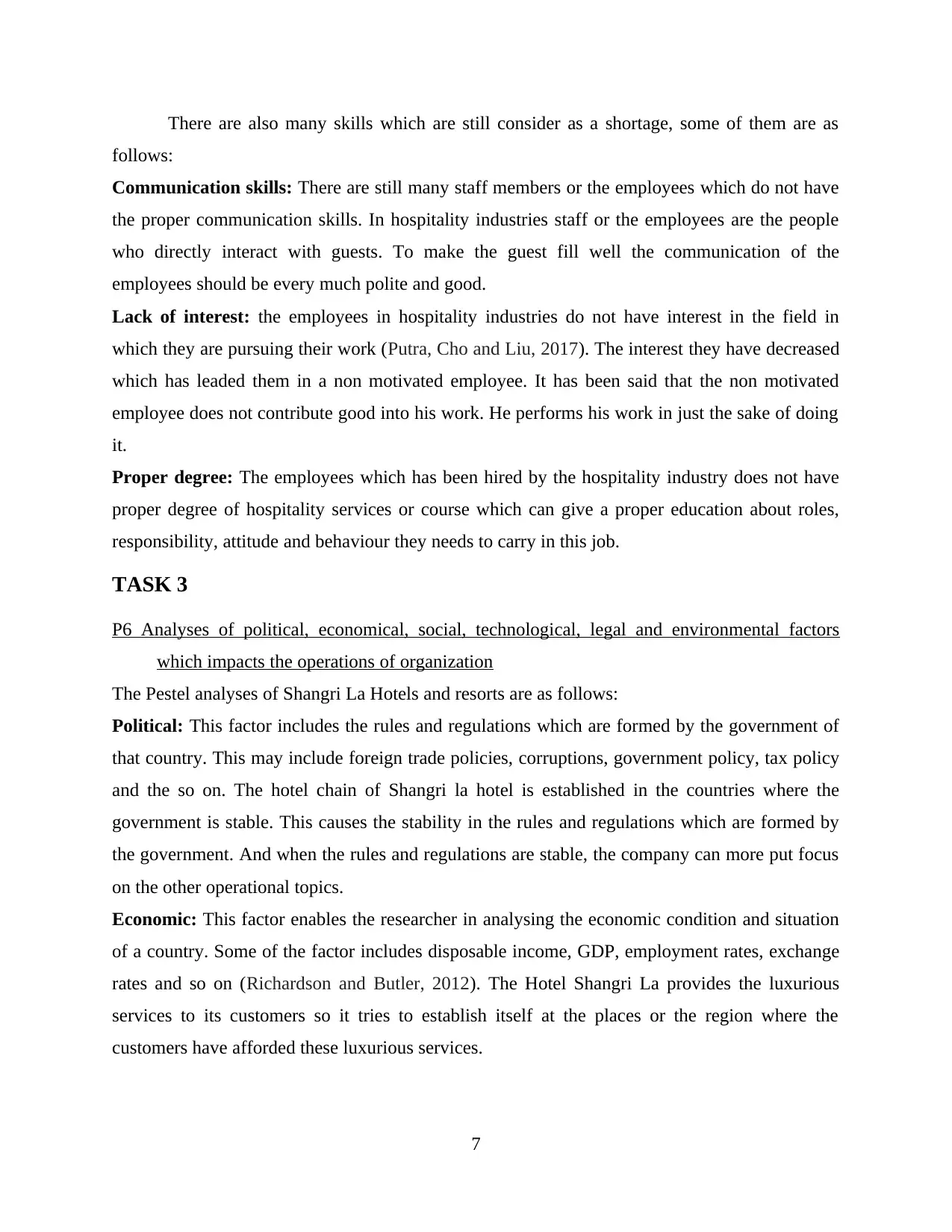
There are also many skills which are still consider as a shortage, some of them are as
follows:
Communication skills: There are still many staff members or the employees which do not have
the proper communication skills. In hospitality industries staff or the employees are the people
who directly interact with guests. To make the guest fill well the communication of the
employees should be every much polite and good.
Lack of interest: the employees in hospitality industries do not have interest in the field in
which they are pursuing their work (Putra, Cho and Liu, 2017). The interest they have decreased
which has leaded them in a non motivated employee. It has been said that the non motivated
employee does not contribute good into his work. He performs his work in just the sake of doing
it.
Proper degree: The employees which has been hired by the hospitality industry does not have
proper degree of hospitality services or course which can give a proper education about roles,
responsibility, attitude and behaviour they needs to carry in this job.
TASK 3
P6 Analyses of political, economical, social, technological, legal and environmental factors
which impacts the operations of organization
The Pestel analyses of Shangri La Hotels and resorts are as follows:
Political: This factor includes the rules and regulations which are formed by the government of
that country. This may include foreign trade policies, corruptions, government policy, tax policy
and the so on. The hotel chain of Shangri la hotel is established in the countries where the
government is stable. This causes the stability in the rules and regulations which are formed by
the government. And when the rules and regulations are stable, the company can more put focus
on the other operational topics.
Economic: This factor enables the researcher in analysing the economic condition and situation
of a country. Some of the factor includes disposable income, GDP, employment rates, exchange
rates and so on (Richardson and Butler, 2012). The Hotel Shangri La provides the luxurious
services to its customers so it tries to establish itself at the places or the region where the
customers have afforded these luxurious services.
7
follows:
Communication skills: There are still many staff members or the employees which do not have
the proper communication skills. In hospitality industries staff or the employees are the people
who directly interact with guests. To make the guest fill well the communication of the
employees should be every much polite and good.
Lack of interest: the employees in hospitality industries do not have interest in the field in
which they are pursuing their work (Putra, Cho and Liu, 2017). The interest they have decreased
which has leaded them in a non motivated employee. It has been said that the non motivated
employee does not contribute good into his work. He performs his work in just the sake of doing
it.
Proper degree: The employees which has been hired by the hospitality industry does not have
proper degree of hospitality services or course which can give a proper education about roles,
responsibility, attitude and behaviour they needs to carry in this job.
TASK 3
P6 Analyses of political, economical, social, technological, legal and environmental factors
which impacts the operations of organization
The Pestel analyses of Shangri La Hotels and resorts are as follows:
Political: This factor includes the rules and regulations which are formed by the government of
that country. This may include foreign trade policies, corruptions, government policy, tax policy
and the so on. The hotel chain of Shangri la hotel is established in the countries where the
government is stable. This causes the stability in the rules and regulations which are formed by
the government. And when the rules and regulations are stable, the company can more put focus
on the other operational topics.
Economic: This factor enables the researcher in analysing the economic condition and situation
of a country. Some of the factor includes disposable income, GDP, employment rates, exchange
rates and so on (Richardson and Butler, 2012). The Hotel Shangri La provides the luxurious
services to its customers so it tries to establish itself at the places or the region where the
customers have afforded these luxurious services.
7
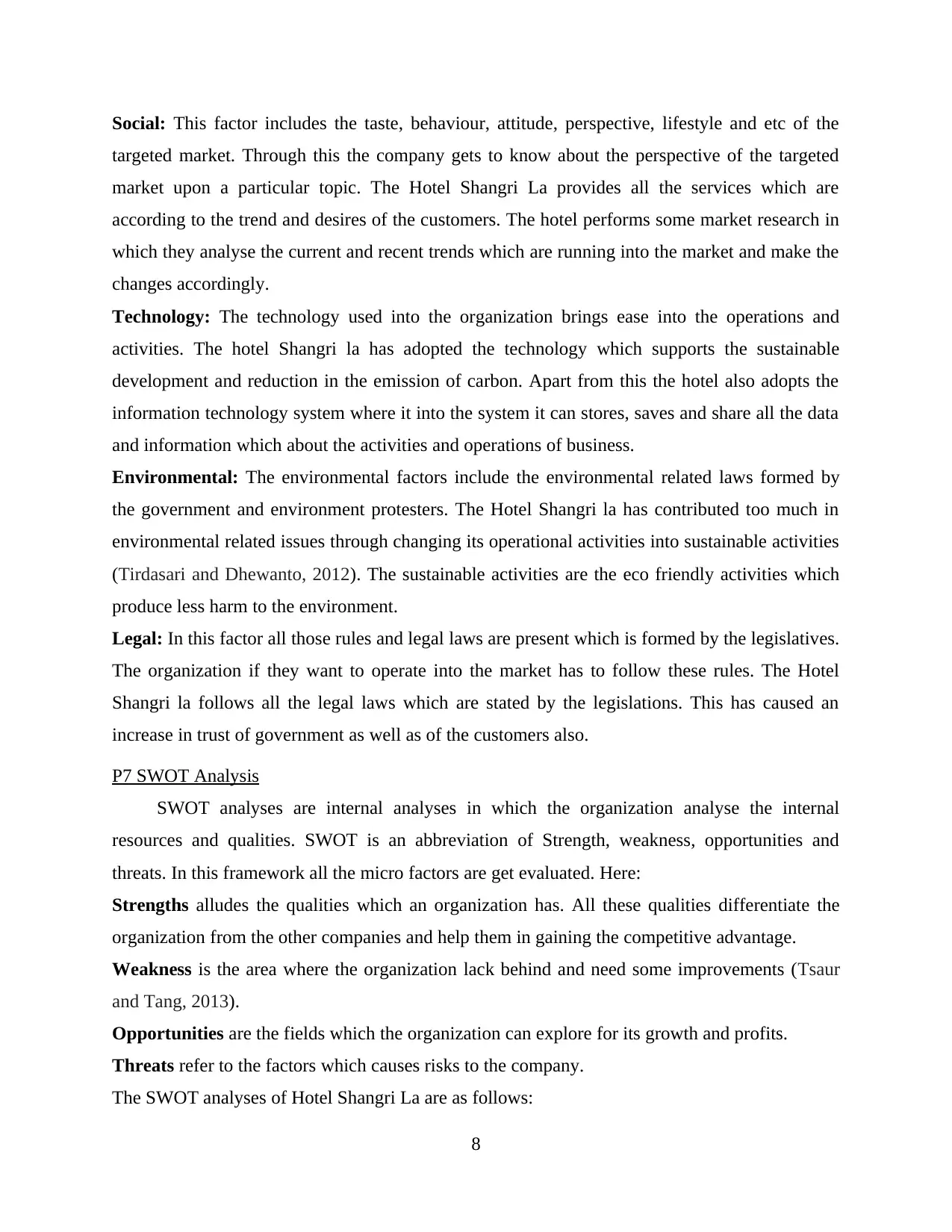
Social: This factor includes the taste, behaviour, attitude, perspective, lifestyle and etc of the
targeted market. Through this the company gets to know about the perspective of the targeted
market upon a particular topic. The Hotel Shangri La provides all the services which are
according to the trend and desires of the customers. The hotel performs some market research in
which they analyse the current and recent trends which are running into the market and make the
changes accordingly.
Technology: The technology used into the organization brings ease into the operations and
activities. The hotel Shangri la has adopted the technology which supports the sustainable
development and reduction in the emission of carbon. Apart from this the hotel also adopts the
information technology system where it into the system it can stores, saves and share all the data
and information which about the activities and operations of business.
Environmental: The environmental factors include the environmental related laws formed by
the government and environment protesters. The Hotel Shangri la has contributed too much in
environmental related issues through changing its operational activities into sustainable activities
(Tirdasari and Dhewanto, 2012). The sustainable activities are the eco friendly activities which
produce less harm to the environment.
Legal: In this factor all those rules and legal laws are present which is formed by the legislatives.
The organization if they want to operate into the market has to follow these rules. The Hotel
Shangri la follows all the legal laws which are stated by the legislations. This has caused an
increase in trust of government as well as of the customers also.
P7 SWOT Analysis
SWOT analyses are internal analyses in which the organization analyse the internal
resources and qualities. SWOT is an abbreviation of Strength, weakness, opportunities and
threats. In this framework all the micro factors are get evaluated. Here:
Strengths alludes the qualities which an organization has. All these qualities differentiate the
organization from the other companies and help them in gaining the competitive advantage.
Weakness is the area where the organization lack behind and need some improvements (Tsaur
and Tang, 2013).
Opportunities are the fields which the organization can explore for its growth and profits.
Threats refer to the factors which causes risks to the company.
The SWOT analyses of Hotel Shangri La are as follows:
8
targeted market. Through this the company gets to know about the perspective of the targeted
market upon a particular topic. The Hotel Shangri La provides all the services which are
according to the trend and desires of the customers. The hotel performs some market research in
which they analyse the current and recent trends which are running into the market and make the
changes accordingly.
Technology: The technology used into the organization brings ease into the operations and
activities. The hotel Shangri la has adopted the technology which supports the sustainable
development and reduction in the emission of carbon. Apart from this the hotel also adopts the
information technology system where it into the system it can stores, saves and share all the data
and information which about the activities and operations of business.
Environmental: The environmental factors include the environmental related laws formed by
the government and environment protesters. The Hotel Shangri la has contributed too much in
environmental related issues through changing its operational activities into sustainable activities
(Tirdasari and Dhewanto, 2012). The sustainable activities are the eco friendly activities which
produce less harm to the environment.
Legal: In this factor all those rules and legal laws are present which is formed by the legislatives.
The organization if they want to operate into the market has to follow these rules. The Hotel
Shangri la follows all the legal laws which are stated by the legislations. This has caused an
increase in trust of government as well as of the customers also.
P7 SWOT Analysis
SWOT analyses are internal analyses in which the organization analyse the internal
resources and qualities. SWOT is an abbreviation of Strength, weakness, opportunities and
threats. In this framework all the micro factors are get evaluated. Here:
Strengths alludes the qualities which an organization has. All these qualities differentiate the
organization from the other companies and help them in gaining the competitive advantage.
Weakness is the area where the organization lack behind and need some improvements (Tsaur
and Tang, 2013).
Opportunities are the fields which the organization can explore for its growth and profits.
Threats refer to the factors which causes risks to the company.
The SWOT analyses of Hotel Shangri La are as follows:
8
⊘ This is a preview!⊘
Do you want full access?
Subscribe today to unlock all pages.

Trusted by 1+ million students worldwide
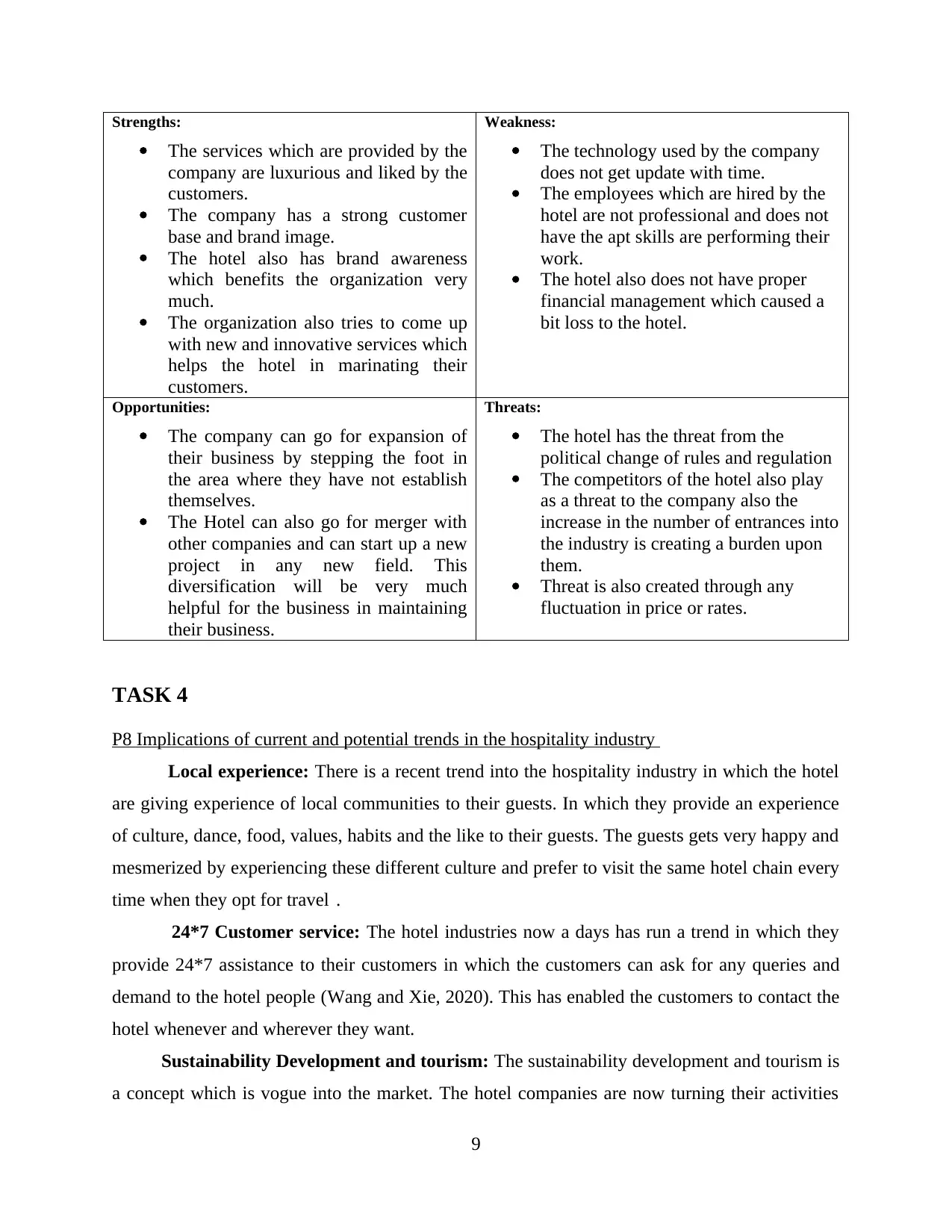
Strengths:
The services which are provided by the
company are luxurious and liked by the
customers.
The company has a strong customer
base and brand image.
The hotel also has brand awareness
which benefits the organization very
much.
The organization also tries to come up
with new and innovative services which
helps the hotel in marinating their
customers.
Weakness:
The technology used by the company
does not get update with time.
The employees which are hired by the
hotel are not professional and does not
have the apt skills are performing their
work.
The hotel also does not have proper
financial management which caused a
bit loss to the hotel.
Opportunities:
The company can go for expansion of
their business by stepping the foot in
the area where they have not establish
themselves.
The Hotel can also go for merger with
other companies and can start up a new
project in any new field. This
diversification will be very much
helpful for the business in maintaining
their business.
Threats:
The hotel has the threat from the
political change of rules and regulation
The competitors of the hotel also play
as a threat to the company also the
increase in the number of entrances into
the industry is creating a burden upon
them.
Threat is also created through any
fluctuation in price or rates.
TASK 4
P8 Implications of current and potential trends in the hospitality industry
Local experience: There is a recent trend into the hospitality industry in which the hotel
are giving experience of local communities to their guests. In which they provide an experience
of culture, dance, food, values, habits and the like to their guests. The guests gets very happy and
mesmerized by experiencing these different culture and prefer to visit the same hotel chain every
time when they opt for travel .
24*7 Customer service: The hotel industries now a days has run a trend in which they
provide 24*7 assistance to their customers in which the customers can ask for any queries and
demand to the hotel people (Wang and Xie, 2020). This has enabled the customers to contact the
hotel whenever and wherever they want.
Sustainability Development and tourism: The sustainability development and tourism is
a concept which is vogue into the market. The hotel companies are now turning their activities
9
The services which are provided by the
company are luxurious and liked by the
customers.
The company has a strong customer
base and brand image.
The hotel also has brand awareness
which benefits the organization very
much.
The organization also tries to come up
with new and innovative services which
helps the hotel in marinating their
customers.
Weakness:
The technology used by the company
does not get update with time.
The employees which are hired by the
hotel are not professional and does not
have the apt skills are performing their
work.
The hotel also does not have proper
financial management which caused a
bit loss to the hotel.
Opportunities:
The company can go for expansion of
their business by stepping the foot in
the area where they have not establish
themselves.
The Hotel can also go for merger with
other companies and can start up a new
project in any new field. This
diversification will be very much
helpful for the business in maintaining
their business.
Threats:
The hotel has the threat from the
political change of rules and regulation
The competitors of the hotel also play
as a threat to the company also the
increase in the number of entrances into
the industry is creating a burden upon
them.
Threat is also created through any
fluctuation in price or rates.
TASK 4
P8 Implications of current and potential trends in the hospitality industry
Local experience: There is a recent trend into the hospitality industry in which the hotel
are giving experience of local communities to their guests. In which they provide an experience
of culture, dance, food, values, habits and the like to their guests. The guests gets very happy and
mesmerized by experiencing these different culture and prefer to visit the same hotel chain every
time when they opt for travel .
24*7 Customer service: The hotel industries now a days has run a trend in which they
provide 24*7 assistance to their customers in which the customers can ask for any queries and
demand to the hotel people (Wang and Xie, 2020). This has enabled the customers to contact the
hotel whenever and wherever they want.
Sustainability Development and tourism: The sustainability development and tourism is
a concept which is vogue into the market. The hotel companies are now turning their activities
9
Paraphrase This Document
Need a fresh take? Get an instant paraphrase of this document with our AI Paraphraser
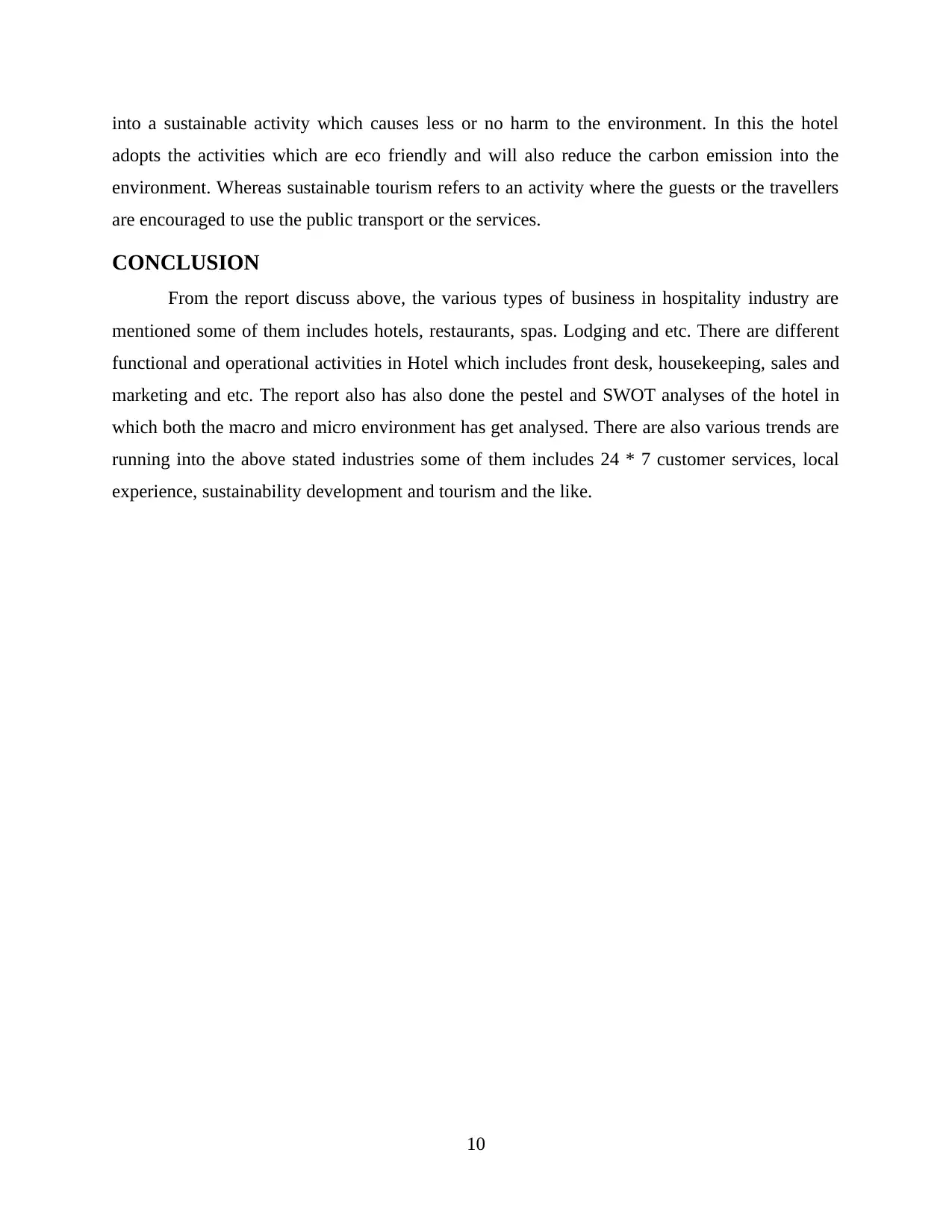
into a sustainable activity which causes less or no harm to the environment. In this the hotel
adopts the activities which are eco friendly and will also reduce the carbon emission into the
environment. Whereas sustainable tourism refers to an activity where the guests or the travellers
are encouraged to use the public transport or the services.
CONCLUSION
From the report discuss above, the various types of business in hospitality industry are
mentioned some of them includes hotels, restaurants, spas. Lodging and etc. There are different
functional and operational activities in Hotel which includes front desk, housekeeping, sales and
marketing and etc. The report also has also done the pestel and SWOT analyses of the hotel in
which both the macro and micro environment has get analysed. There are also various trends are
running into the above stated industries some of them includes 24 * 7 customer services, local
experience, sustainability development and tourism and the like.
10
adopts the activities which are eco friendly and will also reduce the carbon emission into the
environment. Whereas sustainable tourism refers to an activity where the guests or the travellers
are encouraged to use the public transport or the services.
CONCLUSION
From the report discuss above, the various types of business in hospitality industry are
mentioned some of them includes hotels, restaurants, spas. Lodging and etc. There are different
functional and operational activities in Hotel which includes front desk, housekeeping, sales and
marketing and etc. The report also has also done the pestel and SWOT analyses of the hotel in
which both the macro and micro environment has get analysed. There are also various trends are
running into the above stated industries some of them includes 24 * 7 customer services, local
experience, sustainability development and tourism and the like.
10
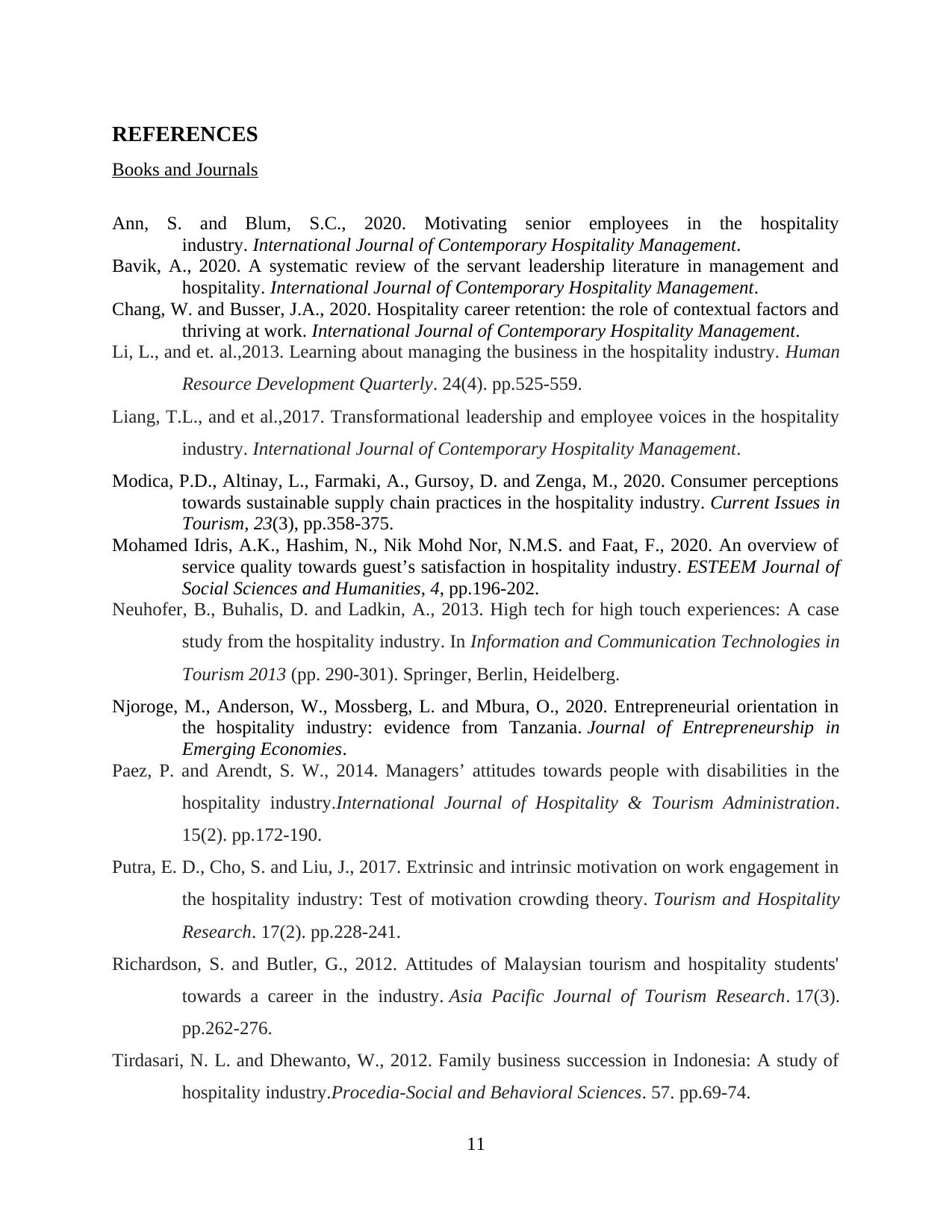
REFERENCES
Books and Journals
Ann, S. and Blum, S.C., 2020. Motivating senior employees in the hospitality
industry. International Journal of Contemporary Hospitality Management.
Bavik, A., 2020. A systematic review of the servant leadership literature in management and
hospitality. International Journal of Contemporary Hospitality Management.
Chang, W. and Busser, J.A., 2020. Hospitality career retention: the role of contextual factors and
thriving at work. International Journal of Contemporary Hospitality Management.
Li, L., and et. al.,2013. Learning about managing the business in the hospitality industry. Human
Resource Development Quarterly. 24(4). pp.525-559.
Liang, T.L., and et al.,2017. Transformational leadership and employee voices in the hospitality
industry. International Journal of Contemporary Hospitality Management.
Modica, P.D., Altinay, L., Farmaki, A., Gursoy, D. and Zenga, M., 2020. Consumer perceptions
towards sustainable supply chain practices in the hospitality industry. Current Issues in
Tourism, 23(3), pp.358-375.
Mohamed Idris, A.K., Hashim, N., Nik Mohd Nor, N.M.S. and Faat, F., 2020. An overview of
service quality towards guest’s satisfaction in hospitality industry. ESTEEM Journal of
Social Sciences and Humanities, 4, pp.196-202.
Neuhofer, B., Buhalis, D. and Ladkin, A., 2013. High tech for high touch experiences: A case
study from the hospitality industry. In Information and Communication Technologies in
Tourism 2013 (pp. 290-301). Springer, Berlin, Heidelberg.
Njoroge, M., Anderson, W., Mossberg, L. and Mbura, O., 2020. Entrepreneurial orientation in
the hospitality industry: evidence from Tanzania. Journal of Entrepreneurship in
Emerging Economies.
Paez, P. and Arendt, S. W., 2014. Managers’ attitudes towards people with disabilities in the
hospitality industry.International Journal of Hospitality & Tourism Administration.
15(2). pp.172-190.
Putra, E. D., Cho, S. and Liu, J., 2017. Extrinsic and intrinsic motivation on work engagement in
the hospitality industry: Test of motivation crowding theory. Tourism and Hospitality
Research. 17(2). pp.228-241.
Richardson, S. and Butler, G., 2012. Attitudes of Malaysian tourism and hospitality students'
towards a career in the industry. Asia Pacific Journal of Tourism Research. 17(3).
pp.262-276.
Tirdasari, N. L. and Dhewanto, W., 2012. Family business succession in Indonesia: A study of
hospitality industry.Procedia-Social and Behavioral Sciences. 57. pp.69-74.
11
Books and Journals
Ann, S. and Blum, S.C., 2020. Motivating senior employees in the hospitality
industry. International Journal of Contemporary Hospitality Management.
Bavik, A., 2020. A systematic review of the servant leadership literature in management and
hospitality. International Journal of Contemporary Hospitality Management.
Chang, W. and Busser, J.A., 2020. Hospitality career retention: the role of contextual factors and
thriving at work. International Journal of Contemporary Hospitality Management.
Li, L., and et. al.,2013. Learning about managing the business in the hospitality industry. Human
Resource Development Quarterly. 24(4). pp.525-559.
Liang, T.L., and et al.,2017. Transformational leadership and employee voices in the hospitality
industry. International Journal of Contemporary Hospitality Management.
Modica, P.D., Altinay, L., Farmaki, A., Gursoy, D. and Zenga, M., 2020. Consumer perceptions
towards sustainable supply chain practices in the hospitality industry. Current Issues in
Tourism, 23(3), pp.358-375.
Mohamed Idris, A.K., Hashim, N., Nik Mohd Nor, N.M.S. and Faat, F., 2020. An overview of
service quality towards guest’s satisfaction in hospitality industry. ESTEEM Journal of
Social Sciences and Humanities, 4, pp.196-202.
Neuhofer, B., Buhalis, D. and Ladkin, A., 2013. High tech for high touch experiences: A case
study from the hospitality industry. In Information and Communication Technologies in
Tourism 2013 (pp. 290-301). Springer, Berlin, Heidelberg.
Njoroge, M., Anderson, W., Mossberg, L. and Mbura, O., 2020. Entrepreneurial orientation in
the hospitality industry: evidence from Tanzania. Journal of Entrepreneurship in
Emerging Economies.
Paez, P. and Arendt, S. W., 2014. Managers’ attitudes towards people with disabilities in the
hospitality industry.International Journal of Hospitality & Tourism Administration.
15(2). pp.172-190.
Putra, E. D., Cho, S. and Liu, J., 2017. Extrinsic and intrinsic motivation on work engagement in
the hospitality industry: Test of motivation crowding theory. Tourism and Hospitality
Research. 17(2). pp.228-241.
Richardson, S. and Butler, G., 2012. Attitudes of Malaysian tourism and hospitality students'
towards a career in the industry. Asia Pacific Journal of Tourism Research. 17(3).
pp.262-276.
Tirdasari, N. L. and Dhewanto, W., 2012. Family business succession in Indonesia: A study of
hospitality industry.Procedia-Social and Behavioral Sciences. 57. pp.69-74.
11
⊘ This is a preview!⊘
Do you want full access?
Subscribe today to unlock all pages.

Trusted by 1+ million students worldwide
1 out of 13
Related Documents
Your All-in-One AI-Powered Toolkit for Academic Success.
+13062052269
info@desklib.com
Available 24*7 on WhatsApp / Email
![[object Object]](/_next/static/media/star-bottom.7253800d.svg)
Unlock your academic potential
Copyright © 2020–2026 A2Z Services. All Rights Reserved. Developed and managed by ZUCOL.




